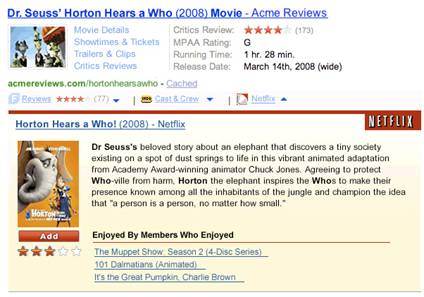Yahoo! frees the Monkey, and announces prizes for a Developer Challenge

In conversation with Yahoo! Research's Peter Mika last week, I jokingly suggested that Yahoo! Search's open developer platform, SearchMonkey, might open its doors to developers this week. Well, they just did, and went a step further by announcing a month-long Developer Challenge and prizes of up to $10,000 for innovative applications.
It's been just three weeks since Yahoo! Search's Director of Product Management Amit Kumar invited a select group of developers to try the SearchMonkey Developer Tool, and today they're opening the doors to all comers.
According to Kumar, Yahoo! Search and Google are 'effectively comparable' when it comes to the quality and spread of their search results, forcing both organisations to find new ways in which to differentiate. He stresses the outcomes of user analysis at Yahoo!, which validated a presumption that search engine users are fundamentally focussed upon the completion of tasks. Neither search nor processing the results returned by a search engine are the end goal for users; these are simply necessary steps in working toward the user's own task, whether that's finding out what's on at the local cinema, ordering pizza, or completing coursework for school or university.
Kumar reports that the Yahoo! Search team thought long and hard, pondering,
"What could we expose to users to help them achieve those tasks?"
The answer, it seems, was to expose structured data with which Yahoo! properties and third-party applications could work to deliver a more compelling and helpful user experience through the inclusion of navigational links, actionable contact details, etc.
"All of the things we were noticing [in user behaviour] are about structured data."
According to Kumar's blog post today,
"Developers can build two types of applications using SearchMonkey – Enhanced Results and Infobars. Enhanced Results replace the current standard results with a richer display. All the links in the Enhanced Results must point to the site to which the result refers. Infobars are appended below search results and can include metadata about the result, related links or content, or links for user actions (such as adding a movie to a Netflix queue)."

Yahoo!'s stated support for established and emerging specifications for marking up and working with structured data potentially bootstraps mainstream adoption for a number of Semantic Web technologies such as RDF. As Kumar suggested, Yahoo! are effectively providing a previously absent incentive for data owners and service providers to expose structured content about themselves, as their data will now be processed by Yahoo! and available for use by any developer who chooses to use the SearchMonkey tools.
As Search becomes an increasingly important piece of the puzzle in completing a remarkably wide range of tasks, all of the major search engine companies must surely be reimagining the way in which the act of searching - and the delivery of search results - can be enriched and differentiated. Yahoo! is taking a brave step in opening up the engine itself, and it will be interesting to see how developers make use of this opportunity; and how Yahoo!'s web properties innovate in order to mitigate the risk of being disintermediated by all those developers who can now access the same data in order to deliver compelling web properties of their own.